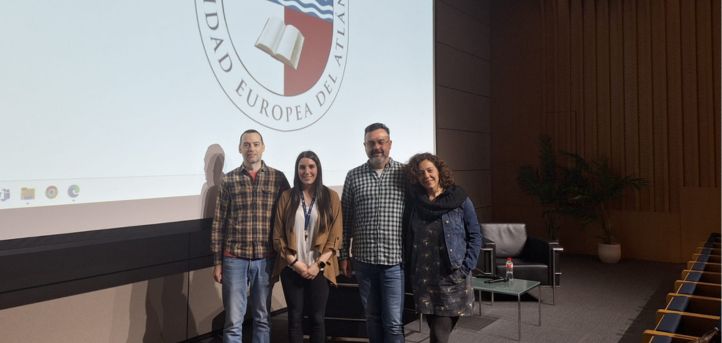The European University of the Atlantic (UNEATLANTICO) held the fourth edition of the Employability Day for the degrees in Translation and Interpreting and Applied Languages. On this occasion, the event featured speakers of great renown in the field of translation, both nationally and internationally.
The Employability Day began with a presentation by Paula Quijano, director of the degree program, and Valentín Barrantes, lecturer at UNEATLANTICO.
Subsequently, the day gave way to two renowned speakers in the field of translation. Both talks focused on audiovisual translation and transcreation (marketing translation). First, Pablo Fernández Moriano, who is in charge of translating films such as Oppenheimer or Deadpool. Fernandez spoke about audiovisual translation and the processes and difficulties that could be encountered.
The second speaker of the morning was Lucía Rodríguez Corral, who is a translator of Pixar and Disney films. Her talk dealt with translation in film and advertising, focusing on the similarities between the two specialties. Both Fernández and Rodríguez focused their presentations on real case studies and showed examples of their own work. They also talked about how to approach audiovisual language to their target audience and how to deal with puns.
Literary round table
During the day, a literary round table was held under the title “An eye for an eye, all blind: revenge is literature”. Paula Quijano took part in this round table together with Andrea Alvear, former student of the degree in Translation and Interpretation and current teacher at UNEATLANTICO, Victoria Revert and Sara Revuelta, students of the double degree in Translation and Interpretation and Applied Languages. The round table addressed the topic of revenge through different points of view, including revenge as part of overcoming grief. During the round table there were also interventions from the audience, making the experience extremely positive for the students present.
Marta Kwasniewska, a lecturer at the Jan Kochanowski University in Poland, then participated in the round table. She spoke about Corvus linguistics and its different points of view, from labor to applied language studies. Above all, she shared a bit about her research and how to approach it in a practical case. It is worth mentioning the close relationship between UNEATLANTICO and the Jan Kochanowski University after Paula Quijano’s multiple moves through the ERASMUS+ program.
Finally, the graduate student of the double degree in Translation and Applied Languages, Jimena González, gave a talk on insertion in the labor market from a neurolinguistic and psycholinguistic perspective. González gave a series of examples focused on the application of linguistics to real cases in the clinical setting. For example, in an open skull operation and the studies that can be derived from this practice, such as language problems, aphasia.
Finally, it should be noted that the organization of the Employability Days for the degrees taught in UNEATLANTICO, are a great opportunity for students to learn about the reality of their sector from the point of view of professionals dedicated to it.


